The now-familiar Live from London format was slightly revised for this recital of sinfonias, arias and duets from Handel’s oratorios and operas, titled Handel: Heroes and Heroines. VOCES8 were represented solely by their artistic director, and on this occasion solo countertenor, Barnaby Smith. He was joined by soprano Mary Bevan and The Illyria Consort, the latter founded and led by violinist Bojan Čičić and comprising some of the most experienced and esteemed period-instrument musicians performing in London, and internationally, today.
In a sense, the programme looked both backwards and forwards, in that it developed the Handel’s Heroines concert presented by the Academy of Ancient Music (with whom many of the Illyria musicians regularly perform) in March 2018, in which Bevan and Jennifer France explored Handel’s glorious writing for the soprano voice, and it anticipates the October release of a newly recorded disc, due out in October, on which he is joined by Bevan (a taster – ‘Ombra mai fú’ – is available online).
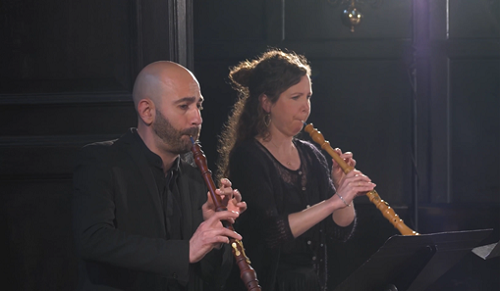
Oratorios came first. ‘The Arrival of the Queen of Sheba’ (from Solomon) was a joyful opener, the two oboes dancing, the strings and continuo light and spirited. There was more pleasure and delight in ‘Crystal Streams in Murmurs Flowing’ from Susanna, but now it was of the naïve and sadly ironic kind, as Susanna bathes luxuriantly in the fresh waters of the stream only to be espied by two Elders who try to hide their voyeuristic desires by condemning the innocent maiden as a temptress. Bevan’s pure, warm soprano was meltingly beautiful against the strings’ cooling, flowing streams: her vocal slurs were exquisite and there was a lovely softness as her soprano descended to the cadences. One could almost smell the scent of the jasmine bower that sends Susanna into virtuous raptures, unaware of the dangers ahead. Bevan’s expressive melodic development in the da capo conversed imitatively with the murmuring and pulsing of the strings and at the end the curling waters of the fountain opened up in a blossoming, climbing gleam.
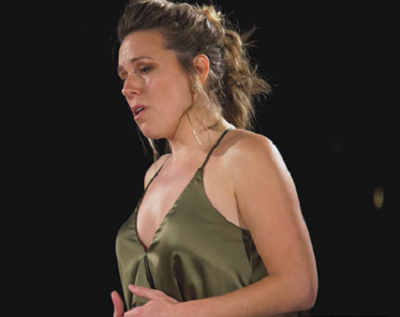
There was more guileless optimism when Smith joined Bevan for the duet ‘These labours past’ from Jephtha in which Iphis and Hamor envisage a glorious future together. The strings were vibrant – breezy exchanges between the two fiddles, easy syncopations – and Bevan’s shine blended comfortingly with Smith’s softer warmth in the affectionate dialogue and running chains of thirds. The duo’s gleeful triplets were as light as air, but focused and true: “how happy we” indeed! Following the more restrained central Andante, the da capo was even more felicitously florid, culminating in an extravagant cadenza in which the two voices wounding around each other, higher and higher, an outpouring of happiness which overflowed into the concluding string postlude.
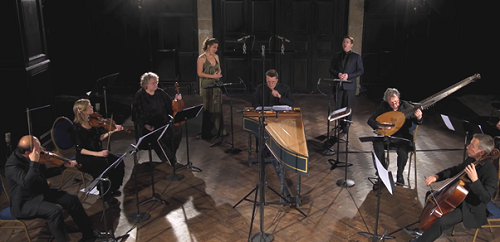
The musicians then turned to opera, starting with the first Italian language opera that Handel composed specifically for the London stage, Rinaldo. The lovely tone and fullness of Smith’s countertenor was a real asset in ‘Cara sposa, amante cara’, and he displayed a fine messa di voce, strength across the registers, clear high Es and an intuitive sense of the expressive and dramatic import of Handel’s melodic gestures, such as intervallic falls and chromatic rises. He does, however, have a tendency in slow arias to swell and ebb through each note, creating a sort of ‘sigh’ which changes the colour of the note and can mar the evenness of line: what can be an effective expressive gesture needs to be used in moderation. But, in the faster B section, Smith was dynamic and used the text well, and the overall impression was one of musical commitment and sound technique.
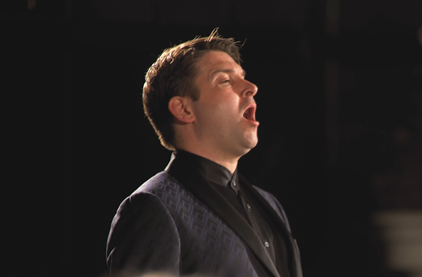
In Ariodante, when the eponymous prince and Dalinda, attendant to Queen Ginevra, discover that the Polinesso has deceived them both, lying about Ginevra’s unfaithfulness, Dalinda vents her fury in ‘Neghitossi or voi che fate?’ Bevan’s rendition of this rage suggested that one wouldn’t want to give the soprano cause for discontent! The power of her lower range only made the flashes of light more thrilling, as she called for the heavens to strike down her betrayer. The vocal runs were superb, set off by robustness and vigour in the strings, and the angry stamping of the bass.
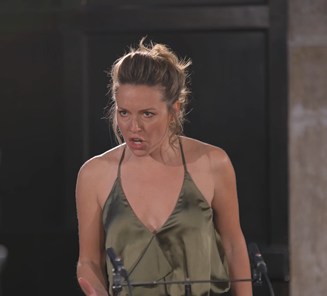
Two numbers exemplifying Handel’s ability to exploit the beauty and depth inherent in simplicity followed. Il trionfo del tempo e del disinganno was Handel’s first oratorio, composed in 1707. It dramatizes a debate between Beauty (Bellezza), Pleasure (Piacere), Time (Tempo) and Enlightenment (Disinganno). In the final aria, ‘Tu del ciel ministro eletto’, Bellezza decides to reject her former vanity and dedication to the pleasure of the moment for the pursuit of eternal truth. But, in pleading to the angels to assist her in her future life of ascetic contemplation, she neglects the lesson of Time: beauty is ephemeral, flowering just for a day and then fading into death. The ensemble’s relentless pulse, steady and unwavering, was thus an ironic refutation of Bevan’s beautifully phrased and sublimely coloured quest for virtue, and the elegance of Bojan Čičić’s solo violin an intimation of the earnest guidance of Time and Disenchantment with whom Bellazza converses.
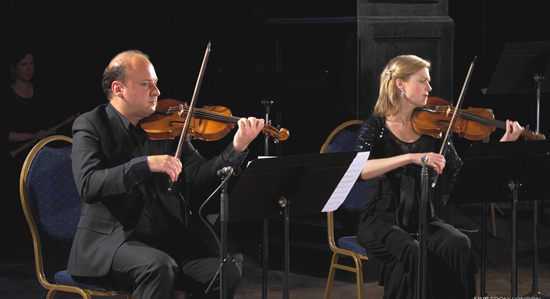
Rodelinda, Regina dei Longobardi was the opera in which Smith made his operatic début, in 2005 with the Victoria Soloists, performing the role of Bertarido, so the duet for Rodelinda and Bertarido which concludes Act 2, ‘Io t’abbraccio’, was a fitting inclusion here. Only recently re-united, the married couple are torn asunder by Grimoaldo who condemns Bertarido to prison and certain death, and the duet represents what they believe will be their last moments together. Once again, the interchanges and chains of thirds were beautifully blended, and the sound of the whole ensemble velvety rich and full, with an emphatic bass suggesting the intensity of the lovers’ feelings at this tragic moment. The two singers relished the twisting sensuousness of the sequence of suspensions, eking out the dissonances by elongating the pulse and spinning curling resolutions in the cadential elaboration.
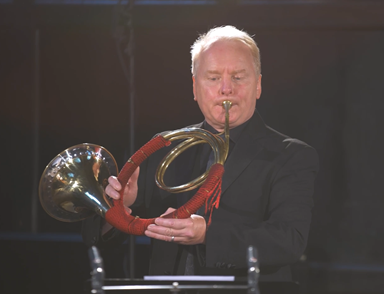
A series of numbers from Giulio Cesare in Egitto closed the programme, starting with the double-dotted majesty of the Overture, and the ensuing robust instrument counterpoint, with fleet semiquavers that run away with themselves, just because they can. In ‘Va tacito’, Smith’s vocal strength, well-defined colours and crisp articulation were put to good use – and matched by horn player Gavin Edwards – and the countertenor displayed an instinctive feeling for both the phrasing and the dramatic moment, as exemplified by judicious ornament at the cadence, as the confident warrior Cesare sings of the hunter’s skill in keeping hidden his deception of his prey.
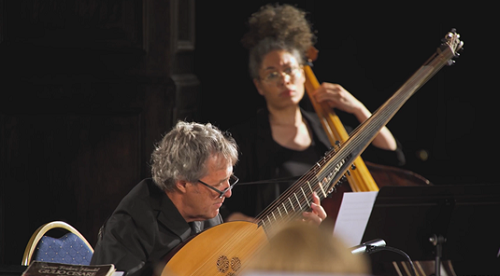
In ‘Piangerò la sorte mia’, Cleopatra swings between extremes, desperately lamenting her fate – condemned to a dungeon and death by her brother Tolomeo for scheming with the presumed drowned Caesar – and then wishing she could return and gain retribution through a vengeful haunting of her brother. It was good here to have the preceding recitative, which Bevan used skilfully to establish mood and context. The aria was notable for the soprano’s clean registral leaps, crystalline tone – complemented by Leo Duarte’s tender flute – and fiery strength. The racing runs of the B section were stunning and enhanced by the consistency and bite of the ensemble’s articulation. With the da capo, a slower tempo intimated that Cleopatra’s energy had burned itself out, David Miller’s expressive theorbo commentary conveying both weariness and despair.
And, to conclude, another duet, but this time one confirming a happy conclusion: ‘Caro! [Bella!] più amabile belta’. Now the joy was not naïve but a true expression of delight and fulfilment. The perfect ending.
This concert and all the performances in the Live from London Summer 2021 series are available on demand (£) until 31st August.
Claire Seymour
Mary Bevan (soprano), Barnaby Smith (countertenor), The Illyria Consort (Bojan Čičić – leader, Davina Clarke – violin II, Jane Rogers – viola, Joseph Crouch – cello, Carina Cosgrave – double bass, David Miller – theorbo, Julian Perkins – harpsichord, Leo Duarte – oboe I/flute, Sarah Humphreys – oboe II, Gavin Edwards – horn)
Handel: Heroes and Heroines
Solomon HWV 67: The Arrival of the Queen of Sheba; Susanna HWV 66: ‘Crystal Streams in Murmurs Flowing’; Jephtha HWV 70: ‘These Labours Past’; Rinaldo HWV 7aI: ‘Cara sposa, amante cara’; Ariodante HWV33: ‘Neghitossi or voi che fate?’; Il trionfo del tempo e del disinganno HWV 46a: ‘Tu del ciel ministro eletto’; Rodelinda HWV 19: ‘Io t’abbraccio’; Giulio Cesare in Egitto HWV 17: Overture, ‘Va Tacito’, ‘Piangerò la sorte mia’, ‘Caro! [Bella!] più amabile belta’
St Anne and St Agnes, VOCES8 Centre, City of London; Sunday 8th August 2021.